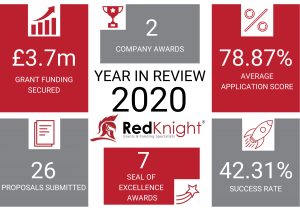Innovation Fund: First call for small-scale projects
 The Innovation Fund, a new European funding stream, has launched its first call for small-scale, clean-tech projects. It has €100 million available and is also offering project development assistance for up to 20 rejected proposals. In line with the Innovation Fund’s wider objectives, the call aims to advance Europe’s transition towards climate neutrality.
The Innovation Fund, a new European funding stream, has launched its first call for small-scale, clean-tech projects. It has €100 million available and is also offering project development assistance for up to 20 rejected proposals. In line with the Innovation Fund’s wider objectives, the call aims to advance Europe’s transition towards climate neutrality.
Eligibility
The competition is open to projects with total capital costs between €2.5 and €7.5 million. Grants will cover 60% of a project’s total expenditure. The evaluators will consider the following award criteria: greenhouse gas emission avoidance, degree of innovation, project maturity, scalability, and cost-efficiency.
All projects should take place within an EU Member State, the only exceptions being Norway and Iceland. This has important implications for UK applicants; any project located in the UK will only be eligible for funding if the EU and UK reach an agreement.
Scope
Grants are available for innovative small-scale projects that are ready for market. For example, eligible projects may focus on making the first sale of new technology to pioneer customers. There are several eligible sectors within which your project can fall: renewables, energy-intensive, industries and substitute products, carbon capture and storage, energy storage. However, the call specifically encourages three key activities: products that substitute carbon-intensive ones, net carbon removal innovations, and direct air capture.
To be eligible for project development assistance, rejected proposals must meet the minimum requirements under the degree of innovation and greenhouse gas emissions criteria, and obtain at least half of the points available for project maturity. Additionally, the evaluators must believe project development assistance will help improve a project’s maturity.
For more information on the small-scale project call, visit the European Commission website. Alternatively, please contact us if you have any questions or would like to arrange a consultation. Subscribe to our free monthly newsletter to receive grant funding news direct to your inbox.
Innovate UK launches two new SBRI competitions
 Innovate UK has announced two new Small Business Research Initiative (SBRI) competitions. The first competition aims to improve hip fracture outcomes while the second aspires to improve multimorbidity acute care.
Innovate UK has announced two new Small Business Research Initiative (SBRI) competitions. The first competition aims to improve hip fracture outcomes while the second aspires to improve multimorbidity acute care.
The SBRI Programme
The SBRI programme provides innovative solutions to challenges faced by the public sector, in order to improve efficiency and effectiveness. The scheme is open to all organisations that can demonstrate a route to market for their solution. However, it is best suited to SMEs.
SBRI: Improving Multimorbidity Acute Care Using Data Analytics, phase 1
Phase 1 will open from 4th January to 3rd March 2021. In this competition, organisations can apply for a share of £160,000 to develop a data-driven solution that improves the care and outcomes for A&E patients with multimorbidity. The solution must:
- Identify multimorbidity patients
- Provide individual risk stratification through real-time data visualisation
- Provide decision support following an emergency admission.
Phase 1 projects can have total costs of up to £10,000, inclusive of VAT. They should start by 5th May 2021 and last up to 3 months. Contracts will only be awarded to single legal entities, but subcontractors are allowed. A decision to proceed with Phase 2 will depend on outcomes from Phase 1. For more information on eligibility and scope, and details on how to apply, visit Innovate UK.
SBRI: Improving Hip Fracture Outcomes Using Data, phase 1
Phase 1 will open from 1st February 2021 to 31st March 2021. In this phase, organisations can apply for a share of £160,000 to develop a solution that will improve the quality of care and outcomes for hip fracture patients. The solution should use routinely collected health data and data analytics techniques.
Phase 1 projects can have total costs of up to £15,000 and projects should last for up to 3 months. Funding is only available for single legal entities however the competition does allow subcontractors. Again, this is Phase 1 of a potential 2-phase competition; a decision to proceed with Phase 2 will depend on the outcomes from this phase. You can find more information here.
If you have any questions about either of the opportunities above, please get in touch. In addition, you can sign up for our free monthly newsletter to receive grant funding opportunities direct to your inbox.
Automotive Transformation Fund has £7 million available
The Automotive Transformation Fund (ATF) supports the industrialisation of a high-value electrified automotive supply chain in order to accelerate the development of net-zero emission vehicles. It is run by the Advanced Propulsion Centre and its partners: Innovate UK, the Department for Business, Energy and Industrial Strategy, and the Department for International Trade.
Scope
This competition invites UK registered organisations to apply for a share of £7 million for relevant economic or technical feasibility studies. The APC is looking for projects that are one of the following:
- Firstly, economic feasibility studies that consider the development of large-scale manufacturing facilities; they should take up to 6 months to complete.
- Secondly, technical feasibility studies that focus on developing advanced manufacturing processes or scaling up product manufacturing. These must take up to 12 months to complete.
Projects must support the UK automotive industry by making it easier for investment to happen in large scale manufacturing, or by building electrified vehicle supply chains. More specifically, projects should focus on one or more of the following products: batteries, motors and drives, power electronics, fuel cell, or recycling any of the above. Alternatively, you can work on the materials and components that go into the product.
Eligibility
All projects must have total eligible costs of under £1 million. Applicants can work in collaboration or employ subcontractors but subcontractors should be based in the UK.
To lead a project or work alone, your organisation must:
- Be a UK registered business of any size, a research organisation, or a research and technology organisation
- Be a grant recipient
- Carry out its project work in the UK and intend to exploit its results from or in the UK.
Interested in applying for funding from the Automotive Transformation Fund? You can find more information here. Additionally, you can contact us to arrange a free consultation.
Subscribe to our free monthly newsletter to receive alternative opportunities direct to your inbox.
The Future of Grant Funding: What to Expect in 2021
 It's time to look towards the future of grant funding, considering what we can expect in 2021. As the end of the year draws closer, so too does the UK’s withdrawal from the European Union. We are currently unsure of what exactly this means for European funding. However, we are hopeful that the UK will continue to be eligible for EU funding streams, including the EU’s new research and innovation framework – Horizon Europe. Keep an eye on our blog and social media channels for updates in the coming weeks.
It's time to look towards the future of grant funding, considering what we can expect in 2021. As the end of the year draws closer, so too does the UK’s withdrawal from the European Union. We are currently unsure of what exactly this means for European funding. However, we are hopeful that the UK will continue to be eligible for EU funding streams, including the EU’s new research and innovation framework – Horizon Europe. Keep an eye on our blog and social media channels for updates in the coming weeks.
National Funding
Government investment in R&D funding has increased, with the Chancellor announcing a £15 billion boost in the 2020 Spending Review. This aligns with the Government’s goal to increase public R&D investment to £22 billion per year by 2024 to 2025. There will continue to be opportunities to apply to national funding schemes in the UK, including Innovate UK. Innovate UK runs regular competitions covering the following sectors: emerging and enabling technologies, infrastructure systems, health and life sciences, and manufacturing and materials. There are also regional funding opportunities, from bodies including SMART Cymru (for Wales-based organisations).
International Opportunities
Additionally, there will also be opportunities for international collaboration on R&D projects. We expect that the UK will remain a Eureka member nation, meaning that UK organisations will still be able to apply to Eureka Eurostars. Eureka Eurostars provides funding for transnational innovation projects conducted by research-performing small and medium enterprises. You can find more information here. It is also likely that there will be further opportunities to collaborate with countries outside the EU, including the US and Canada.
If you have any questions, please contact us. For more information on the future of grant funding, as well as current opportunities, subscribe to our free monthly newsletter.
2020: A Year in Review
2020 – well, where do we begin? It’s been an eventful year for RedKnight and all of our clients, with the Covid-19 pandemic bringing challenges that none of us could have foreseen. We’ve spent the best part of the year working from home, more committed than ever to making innovation funding easier for start-ups and SMEs. It’s fair to say we lost count of all the Zoom meetings a long time ago!
Projects
While the year has had its challenges, it’s also brought highpoints that we as a business are extremely proud of. We've supported projects from a range of sectors, from digital health to advanced materials. In particular, we were proud to support the innovative medtech start-up, GeneFirst, with a successful application to Horizon 2020’s Innovative Medicine Initiative, winning €2.8 million. The competition was extremely competitive; of 144 applications, just 8 projects received funding. An impressive feat, considering RedKnight had just 14 days to develop and write the 70-page application! To read more about GeneFirst’s Rapid-Covid project, and the other successful projects we’ve supported this year, visit our website.
2020 in Numbers

It's been another busy year of bid writing, with 26 proposals submitted at the time of writing. We are proud to have secured a further £3.7 million in grant funding, bringing our total to almost £10 million! Our average application score now stands at 78%, with a success rate of over 42%.
Overall, 2020 has been a great year for RedKnight, and we look forward to taking on new challenges in 2021. We’d like to take the opportunity to say a huge thank you to all of our clients, both new and old, who’ve trusted us to support their proposals. We look forward to following your projects in 2021 and working with you again in the future!
Looking for grant funding in 2021? Subscribe to our free monthly newsletter to receive the latest opportunities direct to your inbox.
The Innovation Fund: €10 Billion Available for Low-Carbon Technology Projects
 Background
Background
The EU Innovation Fund is one of the world’s largest funding programmes for low-carbon technology projects. It will provide around €10 billion of support between 2020 and 2030, supporting Europe's transition to net-zero. By helping businesses invest in clean energy and industry, the Innovation Fund will boost economic growth, create local future-proof jobs, and reinforce European technological leadership on a global scale.
First announced in 2019 and funded by the EU Emissions Trading System, the fund launched its first competition in July 2020. It replaced the Ner300 programme and holds numerous advantages over its predecessor; it improves the risk-sharing for projects by giving more funding in a more flexible way. Not only this, but it has a simpler selection process and is also open to projects from energy-intensive industries.
Scope
Funding is available for both large and small-scale projects. In general, eligible projects will focus on one of the following themes:
- Innovative low-carbon technologies and processes in energy-intensive industries
- Carbon capture and utilisation
- Construction and operation of carbon capture and storage
- Innovative renewable energy generation
- Energy storage
Application Process
For large-scale projects, there is a two-stage application process. Firstly, there is an expression of interest stage, judging project effectiveness, degree of innovation, and project maturity. Then, the second stage is a full application; it considers all the same criteria, as well as scalability and cost-efficiency. In contrast, small-scale calls have just one stage, this being the full application. The Innovation Fund will support up to 60% of the additional capital and operational costs of large-scale projects and up to 60% of the capital costs of small-scale projects.
The first call for small-scale projects is now open and will close on 10th March 2021. For more information, visit the European Commission website. Alternatively, please contact us if you have any questions or would like to arrange a free consultation.
We are unsure whether UK organisations will be able to participate in EU funding streams following Brexit. Sign up for our free monthly newsletter for the latest updates, as well as alternative grant funding opportunities.
Source: European Commission
Eureka Eurostars: Grant Funding Available for Transnational Innovation Projects
 Eureka Eurostars is the largest international funding programme for SMEs wishing to collaborate on transnational innovation projects. It supports research-performing SMEs with research and development to help them gain a competitive advantage; their project results are then rapidly commercialised. Funding for UK SMEs is through Innovate UK. They will cover up to 60% of project costs through grant funding, with a maximum of €360,000 allowed per project
Eureka Eurostars is the largest international funding programme for SMEs wishing to collaborate on transnational innovation projects. It supports research-performing SMEs with research and development to help them gain a competitive advantage; their project results are then rapidly commercialised. Funding for UK SMEs is through Innovate UK. They will cover up to 60% of project costs through grant funding, with a maximum of €360,000 allowed per project
Eurostars in Numbers
According to the Eureka website, 29% of applications receive funding. Significantly, 45% of participants have been successful in reaching new markets, while 84% of project partners form long-term relationships.
Eligibility Criteria
The main eligibility criteria are as follows:
- Firstly, research institutes, universities and large enterprises can participate. However, the project lead must be an R&D-performing SME from a Eurostars country.
- Projects must have a civilian purpose.
- The consortium must include at least two partners independent from each other and established in at least two different Eurostars countries.
- Lastly, you must complete the project in less than 36 months. The Eurostars project market introduction of the project results should be within 24 months of the completion of the project.
How Can RedKnight Help?
RedKnight has an excellent track record with supporting applications to Eureka Eurostars. Most recently, we won €578,684 on behalf of Thermetrix Ltd and €345,566 for the REDEEMA consortia. You can read more about each of these on our projects page. For further information on the Eureka Eurostars programme, please visit their website. If you would like our support with an application, contact us today to arrange a free consultation.
Sign up for our free monthly newsletter to receive grant funding opportunities direct to your inbox.
The ATI Programme: What Funding is Available?
The Aerospace Technology Institute (ATI) Programme is a £3.9 billion partnership between the ATI, Innovate UK, and the Department for Business, Energy and Industrial Strategy (BEIS). The programme aims to grow the UK’s competitive position in civil aerospace, in order to meet the objectives of the UK Aerospace Technology Strategy, ‘Accelerating Ambition.’
Therefore, the ATI Programme offers grant funding opportunities through the following four strands:
1) The Strategic Programme
This strand comprises of 2 phases and is most suited to larger organisations who wish to access grants over £1 million. Phase 1 is an Expression of Interest competition; it opens monthly and the ATI reviews all applications. Then, if successful, the ATI invites applicants to complete a full stage Phase 2 application.
The next round of the Strategic Programme will open between the 7th December and the 23rd December. Find more information, including how to apply, here.
2) R&D Funding for Smaller Businesses
This funding stream will invest up to £8 million in research and technology projects to deliver world-leading aerospace technologies in the UK. An Expression of Interest competition opened on 9th November and will close on 6th January.
3) The National Aerospace Technology Exploitation Programme (NATEP)
In contrast to the Strategic Programme, the National Aerospace Technology Exploitation Programme (NATEP) is ideal for smaller businesses. This is because it offers a maximum £150k grant for projects. Additionally, the programme provides a high calibre technical and management resource to help companies accelerate technology development towards market readiness.
Interested SMEs should keep an eye on the NATEP website, in addition to the UKRI Funding finder, for suitable opportunities through this funding strand.
4) International Programme
Finally, the International Programme issues funding calls for joint R&D projects between the UK and other countries. The last advertised call was between the UK and Sweden in April 2020.
More Information
You can find more information on the entire ATI Programme here. Alternatively, please contact us today if you'd like to discuss an innovative aerospace project with one of our advisers.
Sign up to our free monthly newsletter to receive the latest grant funding opportunities directly to your inbox.
What is the Defence and Security Accelerator (DASA)?

The Defence and Security Accelerator (DASA) is a cross-government organisation, set up in 2016. The organisation “finds and funds exploitable innovation to support UK defence and security quickly and effectively, and support UK prosperity.”
Open Call for Innovation
DASA runs a regular open funding competition to find proposals that address challenges in defence and security. Ideas should be either a concept, technology, or service; if your proposal is a product, then you should instead speak to the Defence Suppliers Service.
There are two main categories within DASA’s Open Call for Innovation:
1. Emerging Innovations
- Firstly, this category is for less mature innovations. Typical projects will deliver a proof of concept at around TRL 3 or 4. Read our introduction to TRLs to determine where your project sits on this scale.
- There is no funding limit, however, DASA typically expects to award between £50k and £100k for projects that last between 3 and 10 months.
- Additionally, click here for examples of projects that DASA has funded.
2) Rapid Impact
- In contrast to 'Emerging Innovations', this strand is for more developed innovations. In more detail, eligible proposals will deliver a technology model or prototype demonstration at around TRL 6 or 7.
- Rapid impact proposals must have a realistic prospect of achieving an impact within a 3-year time frame.
- There should also be a strong customer requirement and capability need for the idea.
- DASA expects to fund bids between £100k and £300k but there is again no specified funding limit.
Innovation Focus Areas
DASA’s Open Call for Innovation welcomes a wide range of innovative ideas in order to solve problems linked to defence and security. However, there are several key topics of interest, as listed below:
- Reducing Reliance on Global Navigation Satellite Systems Quantum Augmented Position, Navigation and Timing Sensing Capability
- Integrate Information and Physical Activity Across all Domains
- Delivering Agile Command and Control
- Operate and Deliver Effects in Contested Domains
- Defence People – Skills, Knowledge and Experience
- Stimulating Future Battlespace Complexity
The next deadlines for DASA's Open Call for Innovation are 28th January 2021 and 31st March 2021 respectively. You can find more information, including how to apply, here. Alternatively, please contact us today if you’d like to discuss an innovative idea with one of our expert advisers.
The UK’s future participation in European funding schemes remains uncertain. Sign up to our newsletter for free monthly updates, as well as more information on alternative grant funding opportunities.
The Green Industrial Revolution: What it means for innovation
UK Prime Minister, Boris Johnson, has this week outlined his Ten Point Plan for a Green Industrial Revolution, marking the beginning of the UK’s path to net zero. The plan will mobilise £12 billion of government investment to create and support 250,000 jobs throughout the UK. Significantly, the Government has pledged that the UK’s industrial heartlands, including Wales, the Midlands, and the North East, will be at the foreground of this movement.
The plan covers a wide range of sectors, including clean energy, transport, nature, and innovative technologies. Innovation will be vital in these areas to ensure that the UK reaches net zero by 2050.
Therefore, the 10 points are as follows:
- Offshore wind: Producing enough offshore wind to power every home, quadrupling the amount of energy the UK currently produces to 40GW by 2030.
- Hydrogen: The Government will work with industry to generate 5GW of low carbon hydrogen production capacity by 2030.
- Nuclear: Advancing nuclear as a clean energy source.
- Electric vehicles: Accelerating the transition to electric vehicles, as well as improving national infrastructure to support the transition.
- Public transport, cycling and walking: Making further investments in zero-emission public transport.
- Jet zero and greener maritime: Supporting the aviation and maritime industries, which the Government regards as “difficult-to-decarbonise.”
- Homes and public buildings: Making homes, schools, and hospitals greener, warmer, and more energy efficient.
- Carbon capture: Developing technologies to capture and store carbon emissions away from the atmosphere.
- Nature: Protecting the natural environment, for example by planting 30,000 hectares of trees every year.
- Innovation and finance: Developing new technologies to ensure the UK reaches its energy ambitions.
Clean Growth and Innovation
Clean growth and infrastructure is a priority area of investment for Innovate UK, as set out in its 2019-20 Delivery Plan. The KTN, who is also playing a key role in this area, welcomed the Government's plans. However, they believe there are areas in which the plan does not go far enough. For example, they suggest more money will be required to decarbonise and retrofit all UK homes, as well as for the maritime sector to become greener.
This year alone, we have seen a multitude of innovation competitions linked to areas set out in the Prime Minister’s Ten Point Plan. Past competitions include sorting and segregating nuclear waste, zero-emission vehicle technologies, and more! Additionally, SMEs can apply now for a share of £5 million to help transform food production towards net zero.
Following the Green Industrial Revolution announcement, we expect to see more environmental competitions in the coming months. Stay up to date with grant funding opportunities on our blog or through our free monthly newsletter.
